Mhoroi!
A special welcome to all the new subscribers! Please be sure to dip into the back catalogue for any creatives you might have missed.
I started this newsletter not only to spotlight the incredible talent across the continent and in the diaspora, but also to document the unique set of challenges that sometimes come with being an African creative. Take, for example, my home country, Zimbabwe, which has been on the wildest economic rollercoaster for the best part of two decades. There has been record-setting hyperinflation! Multiple currencies! Currency shortages! New currency! Add to the mix: electricity shortages, inadequate infrastructure, and limited arts funding. To make it in Zim requires constantly thinking two or three steps ahead, and being ready to pivot or, as we say, “make a plan”. Yet, despite this, the country remains the Little Landlocked Engine That Could, producing an impressive roster of talent in music, literature, and the visual arts.
Today I am bringing you a Zimbabwe double bill! I’m kicking things off with a music CYSK, followed by a bonus section on Zim authors you should know!
Let’s get into it.
This week’s CYSK is Mary Anibal, a 25-year-old mbira player and afro fusion artist. Mary was born in Zimbabwe to Mozambican parents. She comes from a family of singers. Her parents would often perform at church, but one Sunday, they insisted their three daughters sing in their place. Mary remembers being furious at the prospect of performing, having preferred to keep a low profile at church, but she sang along with her sisters, and that became her first public performance. The next big moment in her musical trajectory began in 2012 when Mary discovered the mbira – a musical instrument sometimes referred to as the thumb piano, which would change her life.
Mary, everyone in your family sang. Did anyone play any instruments?
No, but I later discovered, when I sat down with my dad, that his father used to play the valimba and the ngoma because he was a chief (in Mozambique). And my grandmother would play another funnel-like instrument, the name of which I am forgetting right now, and she would also sing. I took the instrument part from my grandparents.
Tell me about your first encounter with the mbira – when did that happen?
It was in 2012, it was orientation at Mabelreign High School. I was starting my form one (first year of high school). Teachers were coming in and out of the class, introducing themselves, explaining the subjects they teach, and providing an overview of what to expect. A teacher was playing the mbira when he came into the room. I just stood there and thought, “What is this?!” It was my first time hearing that sound and seeing the instrument. The teacher introduced himself as Mr. Mhlanga. But I don’t remember much of what he said afterwards; all I could hear was the mbira he was playing as he was speaking. I had been assigned to take Food and Nutrition class as a practical subject, so the teacher told me I was in the wrong class, but I said to the music teacher, “No, I’m in the right place. And I am going to be one of your best students.”
When you heard the mbira that day, what was it about it that spoke to you?
I can’t explain how I felt. I remember completely freezing up. My friend was talking, but everything was just muted. I could only hear the instrument. The sound is so unique. I come from a Christian background, so I wasn't exposed to this instrument because it wasn’t played at church, but this sound was so different and distinct. And hearing it made me go to the music department and sign up to make music my practical subject.
When you went back home and told your parents that you were going to be doing music as one of your subjects, what did your parents say?
I didn’t tell them right away. I waited until I was in Form Two (a year later), by then we were focusing on the mbira as our main instrument. My father saw it at home and he said, “What is this?” And he was asking if I knew anything about it. He threatened to leave it outside. I pleaded with him as leaving it outside would have ruined it. I offered to play something for him. From his point of view, the mbira was un-Christian; it had been demonised. Anyway, I played our favourite song for him, and he said, “This is so nice…”
Could you explain to me why the mbira was demonised?
The mbira was used for ancestral practices by spirit mediums. It was seen as a means of communicating with our ancestors. It was also a form of entertainment and a way to boost morale, especially during the liberation war [independence]. Before colonialism, it was an important instrument. But when Christianity came, it was demonised and seen as an uncivilised instrument linked to unchristian practices, so mbiras were hidden and burnt.
Given the instrument's fraught history within a Christian context, what happened when you began to play it at church?
I didn’t ask. I put the mic inside and I started playing. People looked surprised, but I kept playing, and after some time, they began to receive it.
Is it a difficult instrument to master?
Honestly? If you're not passionate about it, it won't be easy, but if you love the instrument, it will be much easier. It is challenging because you have to find your own unique way of playing. Chiwoniso Maraire had a way of playing I learned a lot from Chi. I also bring my identity and my own playing techniques.
There have been a few Zimbabwean musicians who have built their careers around the mbira, like Chiwoniso Maraire and Stella Chiweshe. Why do you think more Zimbabwean artists have not taken up the instrument?
I think it’s because we are a predominantly Christian country, and there is still a label put on people who choose to play the mbira. Many people would prefer just to fit in. But I think that is like running away from your own shadow! People will always have something to say. They say, “You are a Christian, why are you playing this instrument?” I reply that this is my work and this is my career. I think people are now starting to embrace it more because of an identity crisis and a feeling of being disconnected from our culture.
The mbira has been around for over a thousand years. It is the country’s national instrument. Do you think the lack of uptake by younger artists is due to people not knowing how to work it into a more modern context?
It could be that. It could also be about a desire to keep up with trends like Amapiano and Afrobeats. It’s sad because the mbira is still a super rare instrument within Zimbabwe. You go to America and there are groups that are playing the mbira more than us Zimbabweans. Americans who are learning and teaching the mbira and they are proud of the culture. Some of them even speak Shona better than us people in the urban areas!
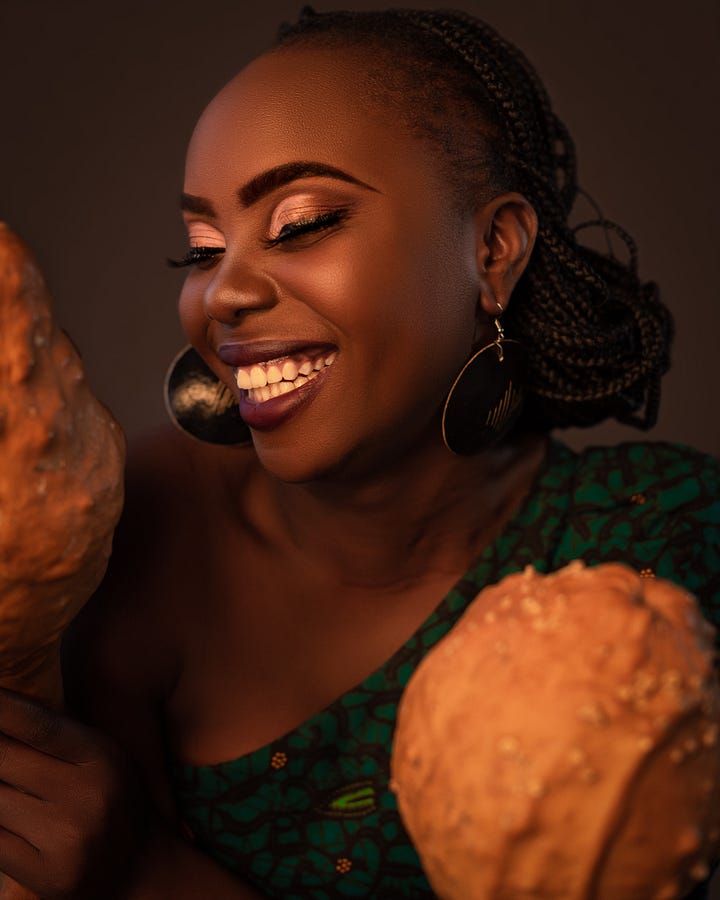
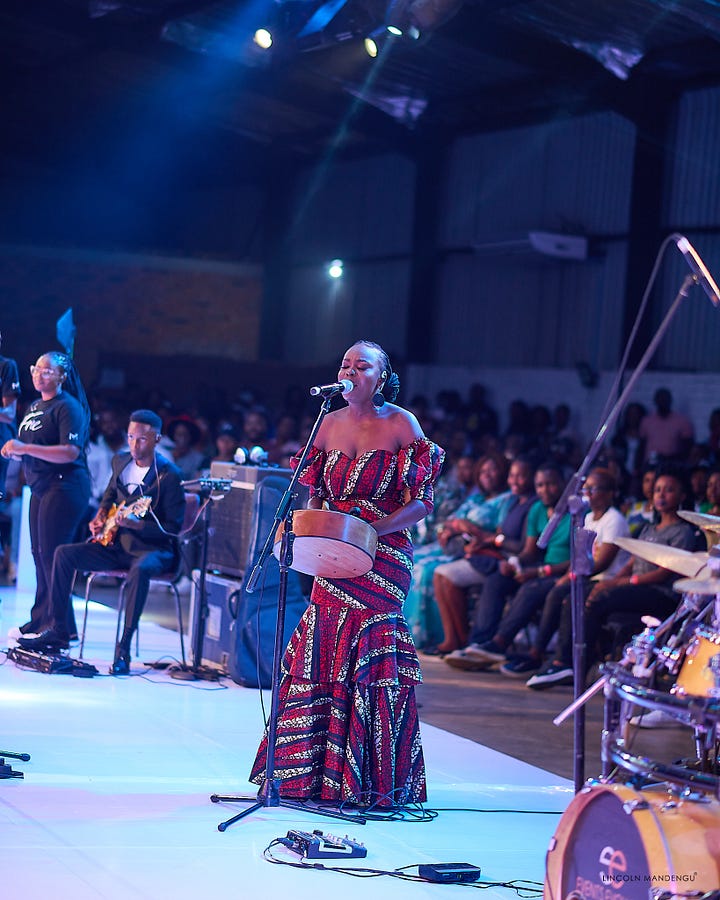


I think there is at times a tendency for people to take local music for granted and as a result artists sometimes have to leave the country to be fully appreciated. Has that been your experience?
Well, it’s always a struggle! Unless you are Jah Prayzah [a popular Zimbabwean contemporary musician], then yes, you have an audience, but Chiwoniso ‘Chi chi’Maraire was an icon, but she was not celebrated as much as she was celebrated when she was out there. So is Mokoomba, so was Ambuya Stella Chiweshe so was Thomas Mapfumo. There is a syndrome that if you want to be celebrated in Zimbabwe, please go outside. I don’t think Zimbabweans have an appreciation of Zimbabwean music, they would rather scream for an amapiano player rather than their own. But when you win a Grammy, that’s when they’ll say “that’s our person!” We need to celebrate one another, even at the grassroots level, until we reach the top.
The music industry is notoriously fickle. Do you still need to work on the side, or can you pursue music full-time? What are the financial realities of being a musician in Zimbabwe in 2025?
Arrghhh! Hustling and hustling! I'm a teacher at Music Crossroads Academy in Zimbabwe. I do part-time vocal training, mbira lessons, and I perform. So I always have some side hustles. I also just started venturing into farming.
What are you farming?
I just got the land. I plan on farming chibage (white maize). You have to ask yourself, what if I wake up without a voice? What will I do? I believe music has a time frame, and if you have the opportunity to invest, it’s essential to do so. Additionally, having a side hustle allows you to have different revenue streams to support your day-to-day life.
You sometimes hear stories about musicians struggling to get visas to go on tour. Have you been able to travel easily?
I've never encountered a challenge when I have had all the necessary paperwork. If I say I am going on the second, I go on the second. I am careful not to do anything that will affect my ability to travel in the future.
You can find out more about Mary and watch her play here.
BOOK BONUS!
Now, over to my friend, the book editor and founder of the Antsu Literary Agency, Wadzanai Mhute, to get her take on which Zim authors we should be reading.
Who are you and what do you do?
I am a book editor, reviewer and a National Book Critics Board Member who is a voracious reader. I tend to read pretty fast, just because I am always either considering reviewing a book, been assigned a review or reading for the NBCC. When I read for pure pleasure, it's usually from my vast TBR (to-be-read) list, and also dependent on how I feel and whether I am ready to read a particular book; those moments are few and far between these days.
How do you find new books to read?
I usually receive books from publicists in the mail or emails with links to digital galleys. As a reviewer, I am always on the lookout for new books, so I tend to browse publisher’s catalogues which they release for upcoming seasons every few months. For instance, I am being pitched now for January 2026 books, so I am never short of opportunities to discover my next read.
What is a book you wish you had written?
There are so many books I could include but at the top of my head, “Maame’ by Jessica George which made me cry, I don’t recall many books that can do that because I can usually separate my emotions from the story. It’s such a beautifully written memorial to her father and I read it just after I lost my mom, and I wished I could have written a book for her. I still may do so.
Let’s talk about Zimbabwean authors…
What I love about the latest crop of Zimbabwean authors is their melding of the complicated history of the teacup nation with the challenges of the present. In doing this, they introduce a mosaic of characters, the issues they face, and how they navigate unusual situations. This is storytelling. I chose these four because they interrogate what a story is; they do not bend to conventions but chart their own paths to bring us a new way of seeing the world. There are many more Zimbabwean writers that I could have included and for a small country to produce such powerhouses, bodes very well for the future of literature.
Siphiwe Gloria Ndlovu
The first book I read by the author was her debut,‘The Theory of Flight’(2018), which uses elements of what can be described as magical realism, but as the author explained, she uses storytelling methods from our culture, which incorporate descriptions of supernatural happenings interwoven with day-to-day lives. On a sentence-to-sentence level, Ndlovu does not waste a word; it’s all in the service of the story, and though it may appear opaque at the beginning, the tale unfurls with each revelation. Ndlovu is also a filmmaker and student of history, and it shows. It’s refreshing to read stories that feature women in history, not as archetypes but living and loving, flaws and all. She will challenge your imagination and your views on storytelling.
Chido Muchemwa
The archivist and storyteller’s debut collection, ‘Who Will Bury You? And Other Short Stories’ was published in 2024 and heralded the arrival of a new voice in Zimbabwean literature. Born and raised in Zimbabwe and now based in Canada, her stories are set in both countries and reflect the journeys and issues faced by a community that is dispersed across the world. Her writing style is quiet, but in telling specific stories, any reader can relate, and that is where the magic happens.
Novuyo Rosa Tshuma
Tshuma is a professor of creative writing who has written three works, ‘Shadows’ a novella, ‘House of Stone’ and her latest ‘Digging Stars’. What strikes me about Tshuma’s work is her language, in each word she weaves beauty and drama, bringing characters to life and having us invested in their futures. All three books are very different, and I love them all but there is something about ‘Digging Stars’ which features a young woman who is studying astronomy and technology, and at the same time discovering who her father was and the unresolved questions she had. Tshuma brings together two cultures, the Bantu and the American Indigenous nations, and their perspectives on astronomy. It’s a natural fit and one Tshuma uses in this story to combine her own life experiences with her curiosity about other cultures.
I look forward to Tshuma’s books because they do what books are supposed to do: they challenge you, they transport, and they satisfy.
Farai Mudzingwa
Mudzingwa has a knack for telling stories of people in the margins. From his short stories to his novella ‘Green Shadows in the Kiya Kiya Republic’ to his debut novel, ‘Avenues by Train’ published in 2023, he explores cultures and beliefs without anthropologising. He tells it as it is and with some humour thrown in. That's what I love about Mudzingwa there is some levity, but it’s couched in humour and wit. He is a keen observer of humanity and gives his characters the respect they deserve, no matter their station in life; he tells their story with care.
A huge thanks to Wadzanai. I also want to thank one of my readers, Bill Farrington who runs Mondo Local for suggesting Mary. Drop me a line if there is a creative you would like me to cover.
Have a good weekend and see you in the comments!






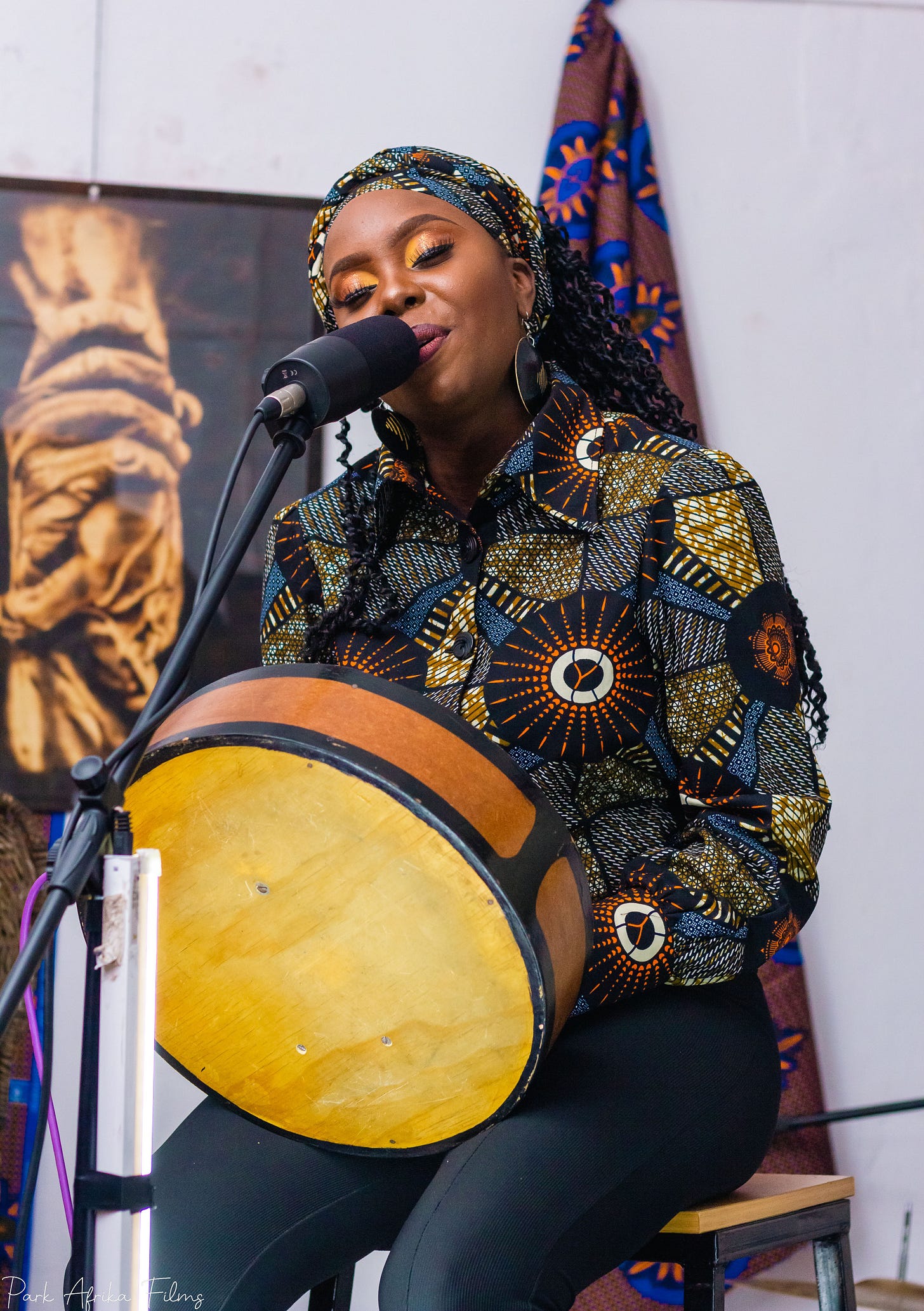
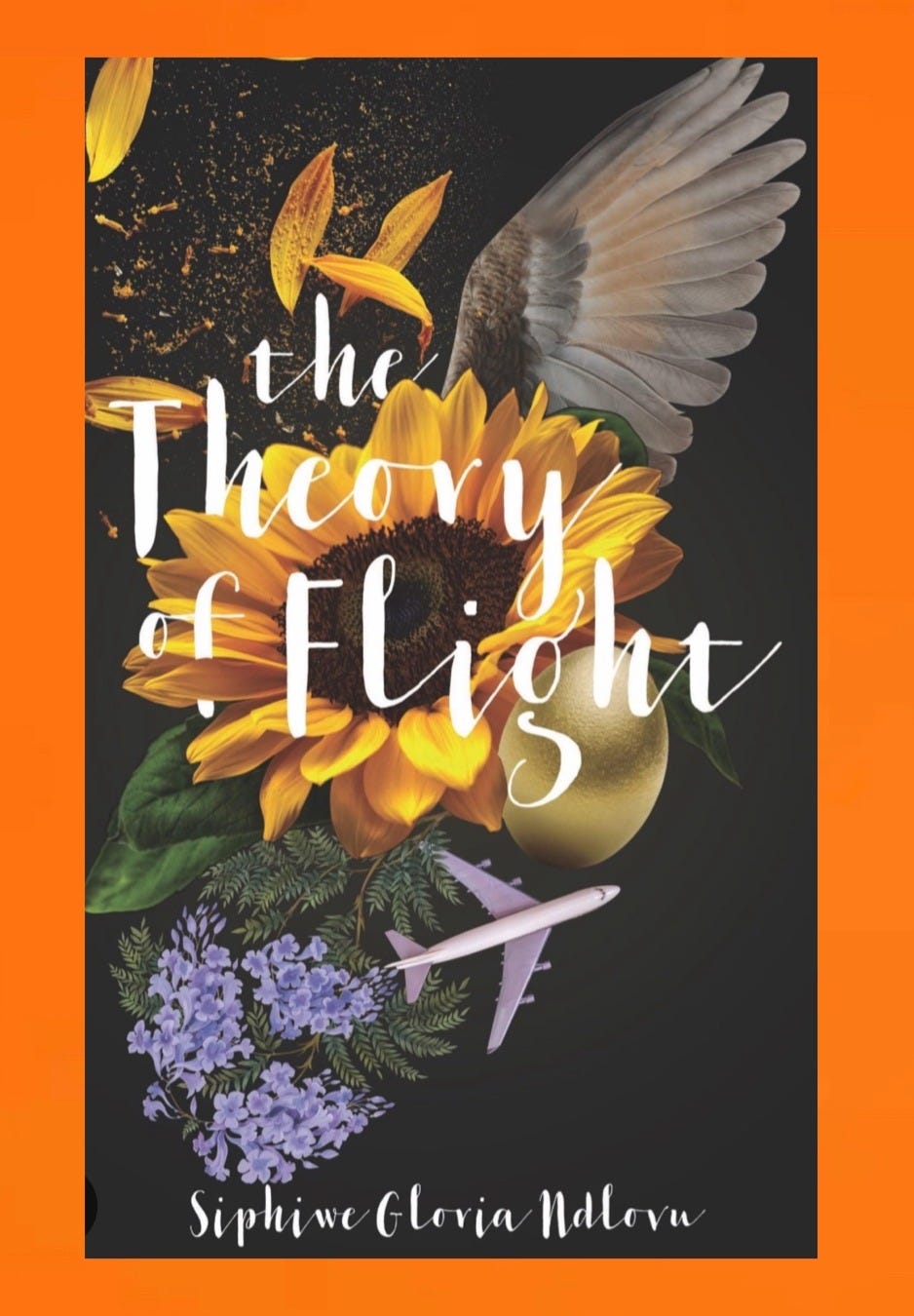

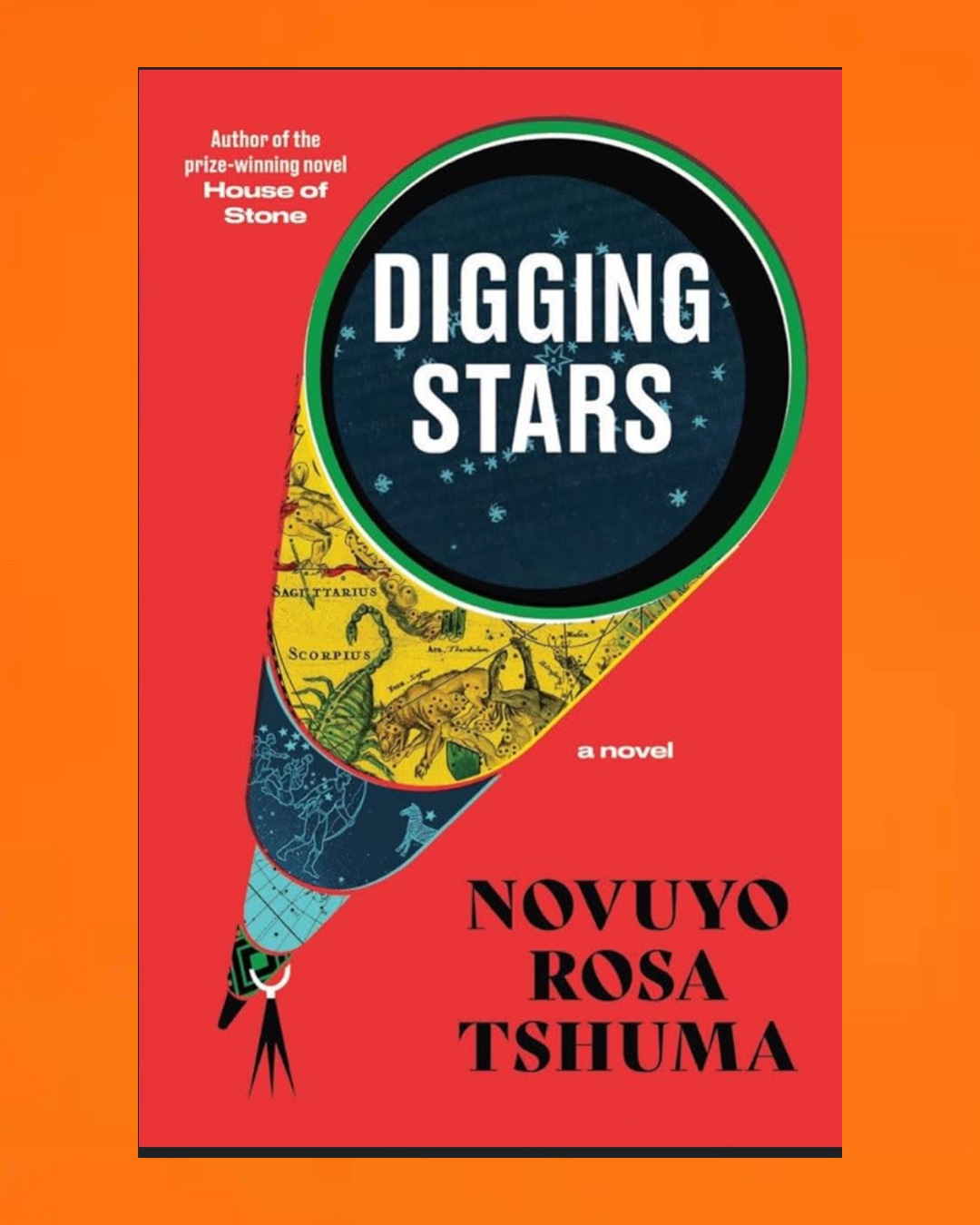

Hi John, thanks for reading and sharing. I remember the joy and discovery of a mixtape cassette!
This makes me wish I could play an instrument. Definitely going to check her out.